Eleven days ago, I ran the Edinburgh Marathon. This was my second marathon in twenty days and my third within seven weeks. All of which is part of a challenge that myself and my friend set ourselves for charity.
Edinburgh was the easiest marathon that I would be facing. It had a lot of downhill near the start and was fairly flat the rest of the way. Despite this, it turned out to be the hardest run of my life. It was a struggle from start to finish.
As you know, my training had gone perfectly for months. We ran 20 miles in late February or early March at an average pace of around 8:25 minute miles. This put us on target for a 3:40 to 3:50 marathon. A few days after that run, things did not go to plan.
Preparing for the Edinburgh Marathon
I pulled my piriformis muscle at the start of March; four weeks before my first marathon in Manchester. This stopped me from training for the month before the marathon (the piriformis muscle is in your ass and can cause a lot of pain as it touches the sciatic nerve – I initially thought it was a hamstring pull).
I ran the race, though it was difficult as I had fever the whole way and had to limp the last eight miles. Two days after the event I went to the hospital and was told that I had contracted cellulitis, a bacterial infection of the skin that causes swelling and fever. My final time was 4:15:01; which was around 30 minutes slower than I hoped. I was desperately disappointed in myself, despite my situation.
Four weeks later, I ran the Belfast Marathon; a course that has a lot of hills. I was unable to do any training before the marathon, apart from a few hill walks. Though my fitness did not seem to be affected much. At the halfway point, I felt confident in getting a time of around 3:45 to 3:50.
Unfortunately, my right quad cramped up at mile 15. The rest of the race, I was effectively running with one leg and dragging the other behind me. I eventually finished the race in 4:06:59, but I am sure I would have managed a 3:50 if I had not cramped up.
I was surprised to get cramp/tightness in Belfast as it is not something I have ever had to deal with in the past. In hindsight, it is clear that myself and Barry underestimated the toll that running a marathon can put on your body. It can take a long time to fully recover from a marathon, and we did not give ourselves enough time to rest.
I struggled to walk for around a week after the Belfast marathon. And right up until the Edinburgh marathon twenty days later, I walked with a limp. Due to the issue with my quad and piriformis muscle, I was not able to do any training whatsoever for Edinburgh. This was frustrating as this was the marathon I always wanted to be fresh for. It was the marathon that I had hoped to get my best time.
However, I had paid for the event and four other friends were running the full marathon, so it made sense to go up to Edinburgh and give it a try. Although I did not train, the pain in my piriformis muscle was much less before Edinburgh than it was before Belfast, so I hoped that I would do well.
The only unknown was my quad. The tightness in my quad is what stopped me at mile 15 less than three weeks before. And it was still super tight, despite my best efforts to stretch it. That was going to be my biggest challenge.
Running the Edinburgh Marathon
The Edinburgh marathon is such a popular event that they actually have two starting points. My friend Denny started at another starting line at 9:50am. Myself, Barry, Gerry, and Stephen, started at another starting point at 10:00am.
I was in good spirits before the marathon. I did not feel much pressure as I knew I was still injured and thought that if things were terrible, I would pull out. Well, that is the lie I told myself; knowing fair well I’d be stubborn enough to keep going.
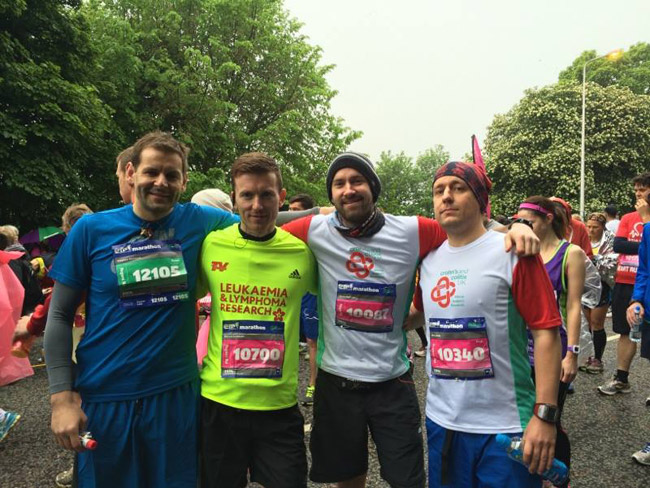
Within the first minute or so of running, I turned to my friend Gerry and said “Oh no, this is not good”. My right quad was super tight already. I knew I had a battle ahead of me.
During the first few miles, I struggled to breathe too, even though a lot of it was downhill. I normally struggle the first mile or so because of my problems with asthma, however I found it tough for several miles. I ran besides my friend Stephen during this period, who struggles with asthma much more than me.
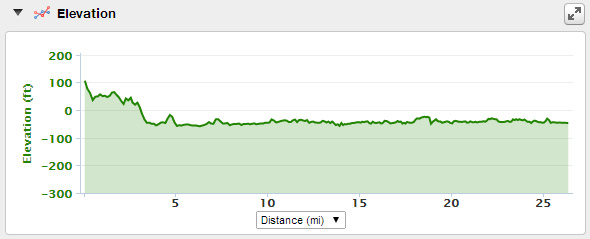
Breathing was not my main concern. From my first few steps, my right quad was super tight, and it got progressively worse every mile. I managed to maintain nine minute miles for the first nine miles. Then my quad got so tight that I could hardly lift my leg. The last 16 miles were hell. Sheer hell. Every step I winced in pain and covered little ground.
I had charged my MP3 player the night before the race, but for whatever reason, the battery was dead. All I had to listen to the whole way was the scuffling of my feet on the ground; a sound that was unavoidable as I could not physically lift my left up high enough to avoid my foot scraping the sole of the trainer on the tarmac.
The problem resulted me in running between twelve and thirteen minute miles and an overall finishing time of 4:47:42.
For those of you who do not run, let me put this running pace into perspective. My friend Barry, who also ran the Manchester and Belfast marathons with me, really struggled too. He managed to complete the marathon in around 4:20; which is all the most impressive to me because he walked the last twelve miles. After the race, we were speaking about our pace. I discovered that Barry’s walking pace was faster than my running pace. That is how slow I was. I was running slower than some people were walking.
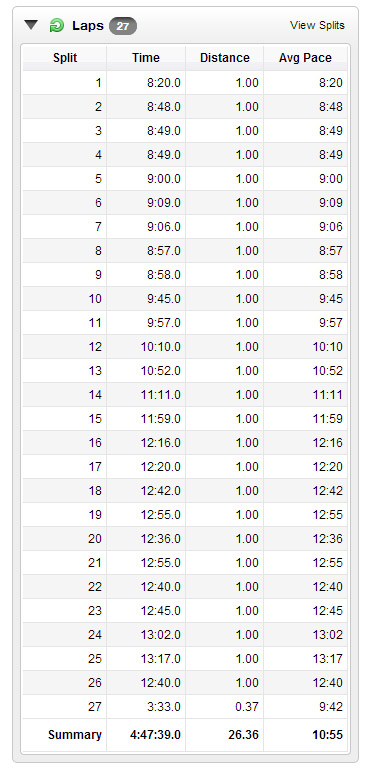
Walking was something that was never on my mind. I saw a lot of people stop and stretch, but I did not want to take the risk of slowing down or stopping, as I was not sure I would be able to start up again.
I realised along the way that other runners and spectators do not recognise when a runner is injured, or carrying a bad injury. A nice guy tried to motivate me at one point and said that I could do better. He meant well, but his good intentions fell on deaf ears as I physically could not go any quicker. I was using every bit of energy in my body just to move along at the snail pace that I maintained.
Barry had a couple of people try and encourage him to come along. While people say this to encourage you, it can be counter productive if you are giving it your all already. Both of us could not physically go any quicker as our legs were so fatigued from the previous marathons. To some people, that seemed to come across as if we were not trying.
Like Belfast, walking was difficult after the race. As was sitting, standing up…and just about any other action that required movement.
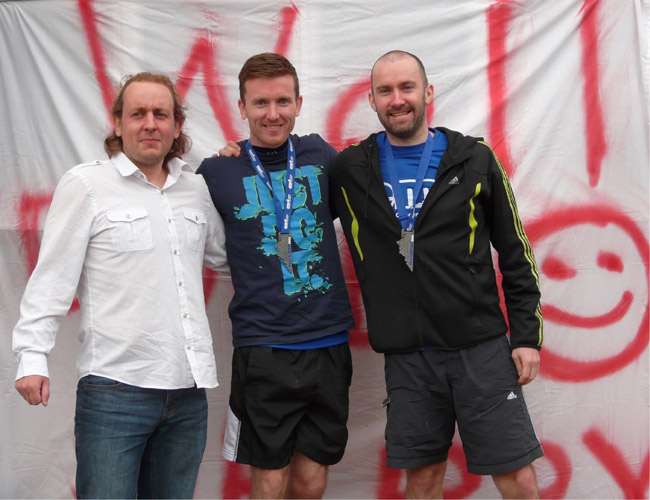
We all went out to an Indian buffet after the race back in our home town. It was great, though I decided not to stay out as I was super dehydrated and had a lot of pain in my legs.
I was however surprised that this stiffness went away quicker than it did in Belfast. I was able to walk up the stairs in my house normally within four days.
My other friends did great. Denny managed around a 3:42, Gerry a 3:45 or 3:46, and Stephen a 4:30.
Moving Forward
Our next challenge is the Welsh marathon in Tenby on 13 July. It is on the same day as the World cup final. My friend Barry has already signed up to the race and booked a hotel.
I have not.
At the moment, it is still a little bit of struggle for me to walk. I do still hope that I can make it. I do not seem to be having as much problem with my pirriformis muscle; the main problem remains my right quad muscle.
Over the next two or three weeks, I hope to stretch the muscle frequently and do some walking. My hope is that by that point, I am in a position to run a couple of miles. If I can do that, I am going to sign up for Tenby.
If I still cannot do light running by the next two or three weeks, I am going to give it a miss. Tenby is one of the hardest marathons in the UK. It has a huge steep hill right at the start of the race, and there are many more in the second half of the race. Ideally, for a race like that, you want to incorporate a lot of hill runs into your training schedule, though even in a best case scenario for me, I do not see me being healthy enough to do that.
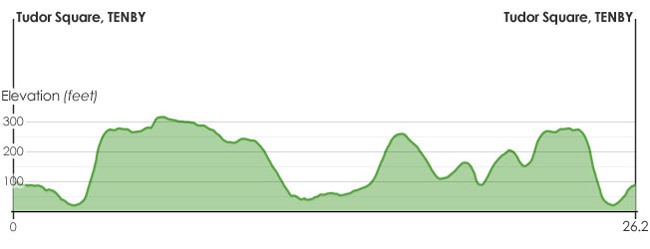
In Edinburgh, the easiest marathon in our four events turned out to be the hardest. Ironically, if I am healthier for the next one, I could end up running my best time in the hardest race.
I won’t be too disheartened if I cannot make it as I want to make a point of getting back into martial arts. Running the marathon will set me back on doing that, so if I cannot run Tenby, I can find solace in the fact that I can start doing martial arts again sooner.
Hope you have enjoyed my recap of my struggle in Edinburgh.
Thanks,
Kevin

